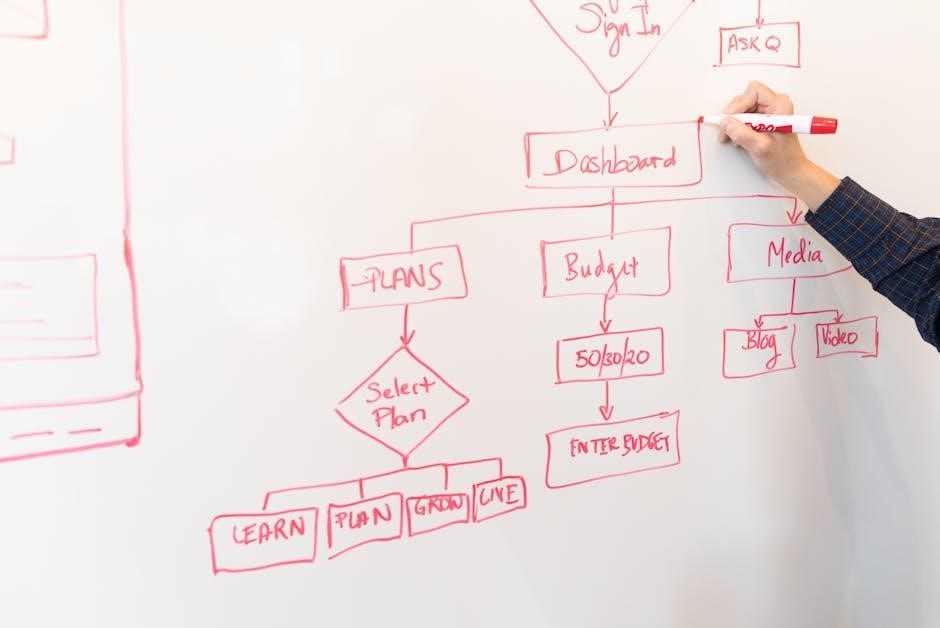The 2024 Accountability Manual provides a comprehensive framework for understanding and implementing accountability across various sectors․ Published in May 2024, it includes 12 chapters and a detailed summary of changes, offering insights into workplace practices, ethical standards, education, safety protocols, privacy policies, and healthcare accountability․
Overview of the 2024 Accountability Manual
The 2024 Accountability Manual is a detailed guide designed to enhance accountability practices across various sectors․ It comprises 12 chapters, each addressing specific aspects of accountability, such as workplace ethics, education standards, safety protocols, and data privacy․ The manual emphasizes the importance of clear goal-setting, ethical decision-making, and the role of technology like AI in improving accountability processes․ It also covers privacy policies, health and aged care standards, and strategies for parenting adult children․ This comprehensive resource provides practical guidance for organizations and individuals seeking to implement effective accountability measures in their respective domains․
The 2024 Accountability Manual introduces significant updates, including expanded chapters on workplace safety and data privacy․ New guidelines on AI integration and ethical decision-making have been added, alongside enhanced sections on education and healthcare accountability․ The manual now includes detailed FAQs on health pricing and updated safety protocols for educational institutions․ These changes reflect evolving standards and technologies, ensuring the manual remains a relevant and comprehensive resource for accountability practices across industries․

Accountability in the Workplace
Accountability in the workplace ensures employees are responsible for their actions, fostering trust and responsibility․ It aligns with organizational goals, enhancing performance and decision-making through mutually respected standards․
Defining Accountability and Its Importance
Accountability refers to the obligation to take responsibility for one’s actions, decisions, and their consequences․ It ensures transparency, fairness, and ethical behavior in professional and personal contexts․ By fostering a culture of accountability, organizations and individuals build trust, enhance performance, and promote continuous improvement․ In the workplace, accountability aligns individual goals with organizational objectives, encouraging employees to own their tasks and outcomes․ This principle is foundational to ethical practices, as it ensures adherence to established standards and promotes a culture of integrity and reliability across all sectors․
Goal-Setting for Achieving Accountability
Goal-setting is a critical process for fostering accountability, as it involves defining clear, measurable objectives that align with organizational or personal aspirations․ By establishing specific targets, individuals and teams can track progress, ensure alignment with broader goals, and maintain focus on desired outcomes․ Effective goal-setting requires transparency, accountability, and regular evaluation to ensure tasks are completed to standard․ The 2024 Accountability Manual emphasizes the importance of SMART goals—specific, measurable, achievable, relevant, and time-bound—to promote accountability and drive results across various sectors․

Ethics and Accountability
Ethics and accountability are deeply intertwined, as ethical behavior ensures responsible actions and decisions․ The 2024 Accountability Manual emphasizes adhering to moral standards to promote trust and integrity․
Understanding Ethics in Professional Contexts
Ethics in professional contexts refers to the norms that distinguish acceptable from unacceptable behavior․ It guides actions, decisions, and interactions, ensuring fairness, honesty, and respect․ The 2024 Accountability Manual highlights ethical standards as foundational to accountability, emphasizing their role in building trust and integrity․ By adhering to ethical principles, professionals align their actions with organizational values and legal requirements, fostering a culture of responsibility and transparency․ This section explores how ethical frameworks influence accountability practices across industries, providing practical insights for maintaining high moral standards in professional environments․

Accountability in Education
Accountability in education ensures schools and institutions deliver quality learning outcomes․ It involves setting clear standards, monitoring performance, and fostering a culture of responsibility and continuous improvement․
Role of Schools in Promoting Accountability
Schools play a vital role in fostering accountability by establishing clear expectations and monitoring student and staff performance․ They implement policies that ensure transparency, fairness, and responsibility, creating a culture of accountability․ Schools also engage parents and communities, promoting shared responsibility for student outcomes and continuous improvement in education quality․
Academic Performance and Accountability Standards
The 2024 Accountability Manual emphasizes the importance of academic performance and accountability standards in education․ It outlines clear metrics for measuring student progress and school effectiveness, ensuring transparency and fairness․ Schools are encouraged to adopt data-driven approaches to track achievements and identify areas for improvement․ Accountability standards also include guidelines for teacher evaluations and resource allocation, fostering a culture of continuous improvement․ By aligning academic goals with measurable outcomes, the manual aims to enhance educational quality and equity, providing schools with actionable frameworks to meet these standards effectively․

Safety and Security Accountability
Safety and Security Accountability ensures protocols and management systems are effectively implemented across educational institutions, fostering a secure environment and upholding rigorous standards․
Safety Protocols in Educational Institutions
The 2024 Accountability Manual emphasizes robust safety protocols in schools, ensuring a secure learning environment․ It includes comprehensive guidelines for public and private institutions, outlining emergency preparedness, access control, and incident response․ Regular staff training and student awareness programs are highlighted to maintain vigilance․ The manual also addresses bullying prevention and cybersecurity measures to protect sensitive data․ By adhering to these protocols, educational institutions foster a culture of safety, accountability, and resilience, ensuring the well-being of students, teachers, and staff․
Workplace Safety and Management Systems
Workplace safety management systems are integral to fostering accountability in occupational environments․ The 2024 Accountability Manual outlines structured frameworks for integrating safety protocols into daily operations, ensuring compliance with regulations․ Employers are encouraged to implement monitoring tools and conduct regular audits to maintain adherence․ These systems promote a culture of responsibility, reducing risks and enhancing overall workplace efficiency․ By prioritizing safety, organizations not only protect their employees but also demonstrate commitment to ethical and accountable practices, aligning with broader accountability standards across industries․
Privacy and Data Accountability
Privacy and data accountability ensure organizations handle personal information responsibly․ The 2024 Accountability Manual emphasizes transparency, compliance, and safeguarding sensitive data to build trust and prevent breaches․
It outlines policies for data collection, storage, and sharing, ensuring ethical practices and adherence to legal standards, fostering accountability in digital interactions and decision-making processes․
Understanding Privacy Policies and Data Protection
Privacy policies and data protection are critical components of accountability, ensuring organizations transparently manage personal information․ The 2024 Accountability Manual highlights the importance of clear, accessible policies that outline data collection, storage, and sharing practices․ It emphasizes protecting sensitive information from unauthorized access and breaches․ Compliance with legal standards, such as GDPR and CCPA, is essential to maintain trust and accountability․ Organizations must also respect data subject rights, including access, correction, and deletion of personal data․ Robust data protection measures ensure accountability in safeguarding individuals’ privacy and preventing misuse of their information․

Health and Aged Care Accountability
The 2024 Accountability Manual emphasizes transparency and compliance in health and aged care services, ensuring patient safety, efficient resource allocation, and ethical practices to meet high accountability standards․
Frequently Asked Questions (FAQs) on Health Pricing
The FAQs on health pricing address common inquiries about cost structures, pricing policies, and transparency in healthcare services․ Developed by the Independent Health and Aged Care Pricing Authority (IHACPA), these FAQs aim to clarify pricing mechanisms, payment methods, and financial accountability in the health sector․ They provide guidance on understanding pricing models, budgeting for healthcare services, and ensuring compliance with regulatory standards․ The FAQs also cover patient rights, billing processes, and ways to address pricing-related concerns, fostering greater transparency and accountability in healthcare delivery․

Parenting and Accountability
Parenting and accountability involve fostering responsibility and ethical decision-making in children․ Parents guide adult children toward mindful choices, balancing support with accountability to prepare them for independent life․
Guiding Adult Children Toward Responsible Decision-Making
Guiding adult children toward responsible decision-making requires a balance of support and accountability․ Parents should encourage independence while setting clear expectations and consequences․ Open communication helps adult children understand the impact of their choices․ Teaching problem-solving skills and financial literacy fosters self-reliance․ Parents can model responsible behavior and provide guidance without controlling decisions․ It’s important to allow adult children to learn from their mistakes, fostering personal growth and accountability․ The 2024 Accountability Manual emphasizes the role of parents in nurturing ethical decision-making and preparing adult children for independent, responsible lives․

Tools for Accountability
The 2024 Accountability Manual highlights tools like AI, feedback systems, and performance assessments to track progress and ensure accountability in various sectors, fostering transparency and improvement․
Interview Questions for Assessing Accountability
Interview questions for assessing accountability focus on evaluating a candidate’s sense of responsibility and past behaviors․ Examples include: “Describe a time you took ownership of a mistake,” “How do you handle feedback?” and “Can you share an instance where you set and achieved a goal?” These questions help gauge self-awareness, problem-solving, and commitment to improvement․ They also reveal how candidates prioritize tasks and maintain accountability in team settings․ Such inquiries are essential for identifying individuals who align with organizational values of transparency and reliability․
Role of AI in Enhancing Accountability Processes
AI plays a significant role in enhancing accountability by automating oversight and ensuring compliance with set standards․ It can monitor tasks, detect anomalies, and analyze data to identify trends or violations․ AI tools improve transparency by providing real-time insights and objective assessments․ They also facilitate consistent decision-making by applying uniform criteria across processes․ Additionally, AI aids in tracking progress toward goals and identifying areas needing improvement․ These capabilities make AI a valuable asset in fostering accountability across industries, from workplace management to healthcare and education, ensuring higher levels of accuracy and efficiency․
